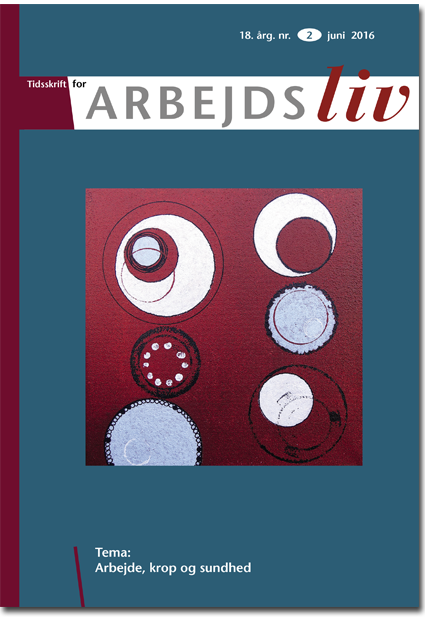Rehabilitative body work in home care
DOI:
https://doi.org/10.7146/tfa.v18i2.110866Abstract
The article presents an analysis of how the body work of home care is transformed when ideals of care as ‘everyday rehabilitation’ (also known as ‘reablement’) are implemented in two Danish home care units. The efforts to transform home care into rehabilitative care in the two units, form part of a nation wide wave of reform initiatives, related to discourses of active ageing and to understandings of quality of life in old age as equal to independence of help. With rehabilitative care efforts home care workers are to activate, coach and re habilitate elderly citizens to live indepen dently and take care of themselves, instead of providing traditional care and assistance, and physically ‘compensating’ for citizens’ disabilities and loss of functional abilities. With a focus on the experiences of home care workers, the article shows how rehabilitative care efforts transform the bodily interactions of home care, and how these transformations lead to new care practices, as well as to new understandings of care work as a less ‘dirty’ occupation. The case studies of the two home care units showed that rehabilitative care en tailed the development of a new optimistic narrative on the nature of home care work. Instead of dealing with illness, decline and ‘dirty’ bodily functions, rehabilitative home care work was understood as deal ing with resources, potential and ‘zest for life’. Furthermore the bodily interactions, or ‘bodily choreographies’, of home care became more physically distanced, and new forms of ‘rehabilitative touch’ were developed by care workers. These new bod ily choreographies were closely intertwined with the optimistic narrative of home care as resource oriented and promoting activ ity and independence. With these new bod ily practices and understandings of home care work, a potential for renegotiation of the status of home care work is created. With rehabilitative care, care work may be understood as a less ‘dirty’ occupation and the low status of care work in professional and ‘dirt hierarchies’ may be challenged. However, with the new practices of care, new potentials for tension and conflict also arise in everyday interactions with citizens, since not all elderly citizens seem to share the ambitions of increased independence and bodily self care.
Downloads
Published
How to Cite
Issue
Section
License
Forfattere, der publicerer deres værker via dette tidsskrift, accepterer følgende vilkår:
- Forfattere bevarer deres ophavsret og giver tidsskriftet ret til første publicering, samtidigt med at værket ét år efter publiceringen er omfattet af en Creative Commons Attribution-licens, der giver andre ret til at dele værket med en anerkendelse af værkets forfatter og første publicering i nærværende tidsskrift.
- Forfattere kan indgå flere separate kontraktlige aftaler om ikke-eksklusiv distribution af tidsskriftets publicerede version af værket (f.eks. sende det til et institutionslager eller udgive det i en bog), med en anerkendelse af værkets første publicering i nærværende tidsskrift.
- Forfattere har ret til og opfordres til at publicere deres værker online (f.eks. i institutionslagre eller på deres websted) forud for og under manuskriptprocessen, da dette kan føre til produktive udvekslinger, samt tidligere og større citater fra publicerede værker (se The Effect of Open Access).





